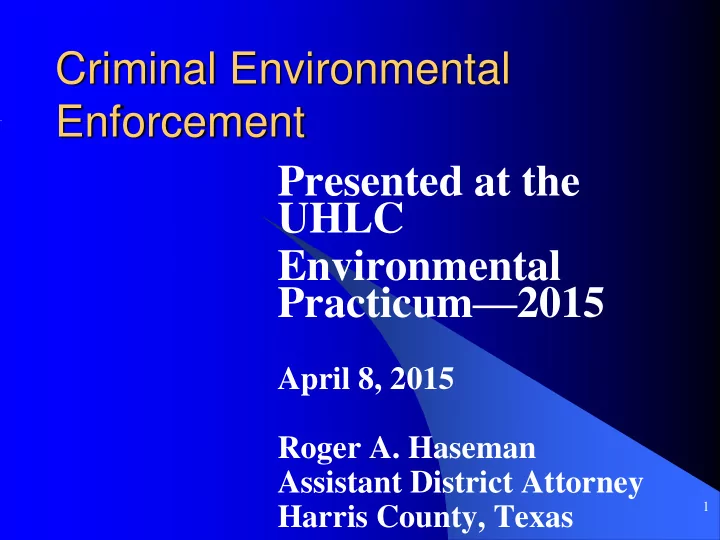

Criminal Environmental Enforcement Presented at the UHLC Environmental Practicum — 2015 April 8, 2015 Roger A. Haseman Assistant District Attorney 1 Harris County, Texas
Overview Historical Perspective Types of Cases Investigative Agencies Stats – 2014 S.E.P.s Training & Education Mens Rea Proof of Knowledge 2
Historical Perspective Began in the late 1970s The Pollution Division One person assigned to this Division as well as other duties Received most, if not all, cases from the Harris County Pollution Control Division (HCPCD), now Pollution Control Services 3
Historical Perspective Responsible for the prosecution of two seminal cases: American Plant Food Corp. v. State (Water Pollution) Exxon Co. U.S.A. v. State (Air Pollution) Still make case law with every trial today. 4
Historical Perspective 1991 – SB2 Created a multitude of new offenses, both felonies and misdemeanors Health & Safety Code Water Code Basic framework we still use today. 5
Types of Cases We Prosecute Illegal Dumping – Strict Liability Water Pollution – Strict Liability Used Oil Act Violations Air Pollution Hazardous Waste Violations 6
Special Situation Cases Parks and Wildlife Code Violations – Sewage discharges from boats – Industrial Waste discharges (Fish houses/Seafood processors) – Prohibited Species cases (Non-native Fish/Plant life) 7
Special Situation Cases Vehicle Emissions Fraud – Tampering with Governmental Records – Inspection Certificates Penal Code Violations, but Clean Air Act related 8
Who Investigates Environmental Crime? HCPCD – HCPCS(PCS) – (Merger with the Health Department) – 15 Investigators and a Laboratory HPD/EIU – 1993 – 6 Police Officers and 6 City Inspectors HCEED – 1993 – 6 Constables 9
Who Investigates Environmental Crime? Texas Parks & Wildlife Department – 2 Game Wardens (Environmental Officers) Texas Commission on Environmental Quality (TCEQ) – 1 Criminal Investigator E.P.A. – ??? County Attorney’s Office 10
Stats – 2014 484 Cases – $266,300.00 247 New Investigations Opened 52 Open Investigations Total Restitution – $85,038.76 Community Service Rest -- $330,400.59 Approximately 40% of cases are felonies 113 Camera Cases Filed 11
Supplemental Environmental Projects (S.E.P.s) Both the City of Houston and Harris County have S.E.P. Accounts Corporations perform projects through Pre- Trial Intervention Agreements Penalties – Fines + S.E.P. Contributions $624,150.00 S.E.P. 12
Training & Education City of Houston Seminars (NEET) – Waste Transporter Seminar – Power/Pressure Washing Seminars – Apartment Complex Sewage Issues – Automotive Industry Seminar HCPCS Training H-GAC Environmental Roundtables 13
Training & Education TCEQ Basic Environmental Course TELEA Conference SEEN Conferences – Our office is an agency member representative for TDCAA FLETC (Advanced Environmental Crimes Course – Two Weeks) NDAA Courses 14
Conclusion No other county in Texas does what Harris County does No other county in Texas has more than one prosecutor assigned to environmental The vast majority of criminal environmental case law has come and continues to come from Harris County Harris County is the leader in Texas on environmental crimes 15
Miscellaneous Items Mens Rea (Culpability) Intentional or Knowing Violations – “with respect to conduct” (Texas law) – Ahmad v. United States (Federal law) 16
Public Welfare Doctrine Strict Liability Offenses – Water Pollution (Chapter 7.147, Water Code) – Illegal Dumping (Chapter 365, H&S Code) Reckless Violations (Endangerment) Criminal Negligence 17
§ 7.202. Proof of Knowledge In determining whether a defendant who is an individual knew that the violation placed another person in imminent danger of death or serious bodily injury under Section 7.168, 7.169, 7.170, or 7.171, the defendant is responsible only for the defendant’s actual awareness or actual belief possessed. 18
§7.202. Knowledge possessed by a person other than the defendant may not be attributed to the defendant. To prove a defendant’s actual knowledge, however, circumstantial evidence may be used, including evidence that the defendant took affirmative steps to be shielded from relevant information. 19
Corporate Responsibility Misdemeanors – Agents/Employees Felonies – High Managerial Agent Sec. 7.22, Penal Code No Probation for Corporations Art. 17A.08, Code of Criminal Procedure 20
Projects § 7.203, Water Code Criminal Enforcement Review Is this statute constitutional or does it violate the Separation of Powers doctrine? See Ex parte John Christopher Lo, No. PD-1560-12 (Tex.Crim.App., March 19, 2014)(Per Curiam Opinion) 21
Projects Right to Enter Provisions § 26.014. Power to Enter Property § 26.173. Power to Enter Property Local Governments Are these provisions constitutional? Or, are they overbroad? 22
Projects May a peace officer enter public or private property at any reasonable time for the purpose of inspecting and investigating conditions related to water quality? Or, must a peace officer first obtain a search warrant? Do exigent circumstances apply? Or, must a peace officer obtain consent? 23
Projects Is it possible for a peace officer to be a trespasser on private property if he enters property, then open for business to the public, for the purpose of investigating a discharge coming from the property? Does it make a difference if the business has “No Trespassing” signs posted? Can a peace officer be a trespasser if he has a legitimate reason to enter the site? 24
Projects – New The Little Hocking Water Assoc., Inc. v. E.I. du Pont Nemours & Co., 2015 BL 64422, S.D. Ohio, No. 09-cv-1081, 3/10/15. Federal court holds land deposition of air emissions can constitute “disposal” of “solid waste.” 25
Projects – New, cont. Citizens may bring a RCRA imminent and substantial endangerment case based on the ground deposition of material emitted from a facility’s smoke stacks. 9 th Circuit refused to recognize a similar claim regarding particulate emissions from locomotives. 26
Projects – New Using drones to gather evidence from business facilities. Is a search warrant needed to fly over and video or photograph the operations and/or suspected illegal activity of a facility? Or does the Open Fields Doctrine apply? Can a drone be used to establish probable cause to obtain a search warrant? 27
QUESTIONS??? Roger A. Haseman Assistant District Attorney Chief, Environmental Crimes Division Harris County, Texas 713-755-5834 haseman_roger@dao.hctx.net 28
Recommend
More recommend